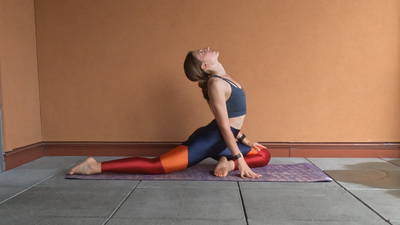Elizabeth came to my office looking for ways to manage her stress. She and her husband work demanding jobs and have three small children.
Elizabeth is 38 years old, carries 40 extra pounds, and looks like she carries the weight of the world on her shoulders. She has become stuck in a familiar pattern of taking care of other people’s needs. On a week long staycation she didn’t even manage to go for a walk or take 15 minutes for herself.
Elizabeth decided that her first goal in our work was to start exercising. We spent a number of sessions trying to tackle the problem.
We talked about the importance of her health for her family—both now and in the long term. We talked about the impact of exercise on stress. We brainstormed physical activities that she would actually enjoy.
While Elizabeth was intellectually on board and coming up with ideas, I could tell her heart wasn’t in it. Finally, I had an intuitive flash. “It sounds to me like you don’t want to exercise,” I said.
Elizabeth looked at me wide-eyed. “You’re right! I don’t want to exercise.” She paused. “That feels so good to say—I feel relief—I don’t want to exercise!”
The whole room felt lighter. I began to breathe more deeply. It looked like Elizabeth did too. “That’s right,” I thought, “she doesn’t want to exercise.”
Of course the story doesn’t end there. Elizabeth needed to exercise and she knew it. But until that point we had both been trying to force her to do something she didn’t want to do.
With this new realization, the part of Elizabeth that didn’t want to exercise had entered the conversation. We asked that part of her why she didn’t want to exercise. Answer: she never had time for herself. She resented exercise as one more demand on her time.
We asked her to talk about how she felt on a daily basis. “Exhausted.” And we asked her how it felt to be told to exercise. “Enraging.” It was just one more area of her life in which she was obligated to perform
A cloud lifted as Elizabeth gave herself permission to talk about how she really felt. The part of her that didn’t want to exercise was brought into the conversation. And we could talk with her. We could make a strategy for making room for the things that this part of her wanted. And we could give that part of her the time to get on board.
What can we learn from Elizabeth’s story?
The Importance Of The Present Moment.
“Aha moments” are gifts. But for many of us they aren’t coming and they aren’t coming fast enough. We need another approach.
The surest way to an Aha moment is to stay in the present. To take ourselves seriously—as we are right now—not as we wish we were. And we need to be listened to. As we are. Starting where we are is all we can do.
As a therapist it is my experience that most of us don’t want things to be as they are. We all have ideas about the way we want things to be. And we are often stuck in these ideas.
As we sift through all these ideas we eventually come upon a description of the present. Once we can allow our self to articulate what it is like to be us right now in the present, change begins. And relief and revitalization are close behind.
Emotional Health Can Be The Key To Physical Health
The fitness industry is prone to the positive psychology approach—something like “imagine yourself succeeding and just do it!” This works in some cases, but it has limits. And it is important to recognize those limits.
Each of us has experienced losses that we grieve, traumas that we bear, and wounds that we carry. All of these need a place.
Emotional health includes the ability to express the full range of emotions—from sadness to anger to joy. Repression of any one of these areas will result in sub-optimal emotional health which impacts physical health in a multitude of ways. In fact, the two aren’t really separate at all.
Elizabeth didn’t want to exercise because she was overextended, depleted, and angry about it. And she wasn’t allowing herself to feel and express those things directly.
With time and attention, Elizabeth was able to put her feelings into words. As she did this she was able to create small amounts of time in her schedule to rest and restore.
It wasn’t long before she was ready to hit the gym. She is now at the gym twice a week having lost 15 pounds in the past year.
Elizabeth had the courage to take her time. And she cared about herself enough to listen to what she needed in the present even when it wasn’t what she wanted or expected to hear. She took her emotional health seriously and the results were deep and lasting.







